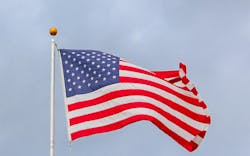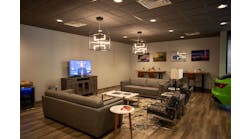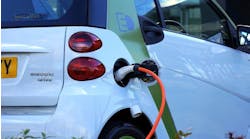Today’s repair industry has a troubling problem. Over 50 percent of technician positions are unfulfilled, with the expectation that this percentage will increase in the near future.
Some shops are tackling this issue in unique ways. American Warrior Garage in Bremen, Ga. trains veterans to become auto repair technicians, offering a solution to veteran unemployment rates and on the technician shortage.
Servicing Those Who Served
American Warrior Garage is a 501 (c) (3) non-profit that is completely volunteer run and is fueled by the slogan “By Vets, For Vets”.
“Our way of giving back to the veteran community is through the automobile repair and restoration services,” explains Scott Jones, who owns and operates the shop with business partner Vince Gibson.
As veterans themselves, they both understand what it’s like to return from service without having a clear path to follow. It can be daunting to adjust back to society, from landing a job to owning a working vehicle.
Jones and Gibson offer this career guidance in an effort to combat veteran unemployment rates and bring in more technicians to the industry overall, therefore helping to counteract the technician shortage. They enroll two veterans per quarter and aid them in working toward their ASE Certification.
This process is made possible through the GI Bill and private funding. They provide the vets with food and housing support for the duration of the class, and are currently working with a company to supply these vets with a set of tools by 2020 that they can take with them after training is complete.
“When [veterans] come out of the service, a lot of them don’t know what they want to do,” Jones explains. “What they were trained to do there doesn’t necessarily work over here. We get them headed in the right direction.”
How It Began
In addition to job training, American Warrior Garage conducts repairs for the general public. This allows them to bring in revenue and keep their bottom line. Bringing in money is not necessarily their main goal, but it is obviously an important element in staying open. They also retrofit vehicles for disabled veterans, a venture that they are hoping to expand more in the future.
This idea, as well as the concept for the shop overall, initially began in 2014 when Gibson parked his newly restored 1969 El Camino in a department story parking lot. It caught the eye of a veteran, who mentioned to Gibson that he admired the car and wished he could have one of his own.
The two bonded over military life, and Gibson got to wondering how he could help out that vet, who happened to be a double amputee as a result of his service.
Gibson and Jones talked this over—why couldn’t that vet have a car like Gibson’s?
Where They Want To Go
One of the first vehicles that they worked on for a disabled veteran was a Chevelle from the ‘70s. It already had some “homemade” hand controls in it, according to Jones. They improved the function of these hand controls for enhanced accessibility and spruced up the exterior and interior of the vehicle.
While they have continued to do some retrofitting for other veterans, the are specifically trying to zero in on developing a physical prototype of hand controls for other potential customers to see and experience.
“Our initiative for 2020 is that we took the hand controls that we used in his car, we’ve got drawings and designs,” Jones says. “We’re going to see if we can’t refine them to where we can outfit them in similar cars.”
It is a unique proposition: implementing advanced car adaptations into the muscle car territory as well as other older vehicles. Jones explains that this is definitely more of a challenge, but they are willing to put the work in order to give veterans more options.
At the same time, they contribute to a greater issue faced by repair shops of all kinds in today’s society: the industry flat-out needs more technicians. Jones and Gibson took something they were passionate about and turned it into a piece of the solution to a larger problem.



